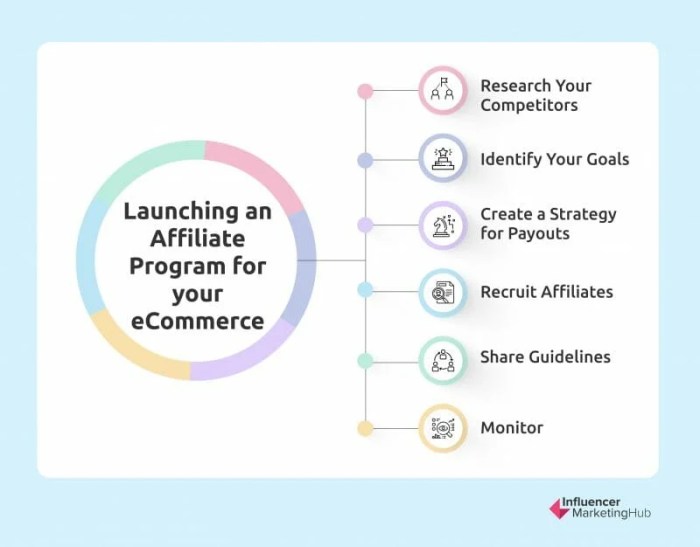Using Affiliate Marketing for E-commerce sets the stage for this enthralling narrative, offering readers a glimpse into a story that is rich in detail with American high school hip style and brimming with originality from the outset.
Get ready to dive into the world of affiliate marketing and its impact on e-commerce businesses!
Introduction to Affiliate Marketing in E-commerce: Using Affiliate Marketing For E-commerce

Affiliate marketing in the e-commerce industry is a strategic partnership between online retailers (merchants) and individual marketers (affiliates) to promote products or services. Affiliates earn a commission for driving traffic or sales to the merchant’s website through their marketing efforts.
How Affiliate Marketing Works
Affiliate marketing works by affiliates promoting products or services through unique tracking links provided by the merchant. When a customer clicks on the affiliate’s link and makes a purchase on the merchant’s site, the affiliate earns a commission. This performance-based model allows merchants to expand their reach and increase sales without upfront costs.
Yo, have you heard about the latest trend in marketing? Using AI in Marketing is the bomb right now! It’s all about leveraging artificial intelligence to analyze consumer behavior and optimize marketing strategies. Check out more about it here if you wanna stay ahead of the game!
Benefits of Affiliate Marketing for E-commerce Businesses, Using Affiliate Marketing for E-commerce
- Affordable Marketing: Merchants only pay affiliates when a sale is made, making it a cost-effective marketing strategy.
- Increased Reach: Affiliates can help merchants reach new audiences and drive more traffic to their websites.
- Improved : Affiliate links can improve a merchant’s search engine ranking by generating more backlinks.
- Measurable Results: Merchants can track the performance of their affiliate marketing campaigns to optimize for better results.
Role of Affiliates and Merchants in Affiliate Marketing Partnerships
Affiliates are responsible for promoting the merchant’s products or services through various marketing channels such as websites, social media, or email marketing. They earn a commission for each successful referral or sale they generate for the merchant.Merchants, on the other hand, provide affiliates with marketing materials, tracking links, and timely payments for their efforts. They benefit from increased sales, brand exposure, and access to new customers through their affiliate partnerships.
Yo, have you heard about the latest trend in marketing? It’s all about Using AI in Marketing to boost sales and reach target audiences more effectively. With artificial intelligence, businesses can analyze data, personalize ads, and even predict consumer behavior. It’s like having a virtual marketing genius on your team!
Setting up an Affiliate Marketing Program
To launch a successful affiliate marketing program for your e-commerce store, follow these steps:
Criteria for Selecting Affiliates and Establishing Partnerships
- Identify your target audience: Choose affiliates whose audience aligns with yours to ensure maximum reach and conversions.
- Evaluate affiliate experience: Look for affiliates with a proven track record of successful marketing campaigns and conversions.
- Review affiliate content quality: Ensure that affiliates produce high-quality content that reflects positively on your brand.
- Establish clear communication channels: Maintain open lines of communication with affiliates to provide support and guidance.
Tracking and Measuring Success of Affiliate Marketing Program
- Utilize affiliate tracking software: Implement tracking tools to monitor affiliate performance, clicks, and conversions.
- Set key performance indicators (KPIs): Define specific metrics like conversion rates, click-through rates, and revenue generated to measure success.
- Analyze data regularly: Review reports and analytics to identify trends, optimize strategies, and make data-driven decisions.
- Reward top-performing affiliates: Offer incentives and bonuses to affiliates who drive significant sales and traffic to your e-commerce store.
Strategies for Effective Affiliate Marketing
Affiliate marketing is a powerful tool for e-commerce businesses to drive sales and increase brand awareness. To optimize affiliate marketing campaigns, businesses need to implement effective strategies to maximize results. Let’s dive into some key strategies for successful affiliate marketing in e-commerce.
Content-based Affiliate Marketing vs Coupon/Deal-based Strategies
- Content-based Affiliate Marketing:
- Focuses on creating high-quality content that adds value to the target audience.
- Utilizes blogs, reviews, videos, and social media to promote products in a non-intrusive way.
- Builds trust and credibility with the audience, leading to higher conversion rates.
- Coupon/Deal-based Strategies:
- Offer discounts, deals, and coupons to attract price-sensitive customers.
- Appeals to customers looking for the best bargains and savings.
- Can drive quick sales but may not always result in loyal customers.
Choosing the Right Affiliate Marketing Networks
- Research and select affiliate networks that align with your e-commerce business goals and target audience.
- Consider the reputation, reach, and commission structure of affiliate networks before partnering with them.
- Look for networks with a diverse range of affiliates to reach different demographics and niches.
- Regularly monitor and evaluate the performance of affiliate networks to ensure they are delivering results.
Legal and Ethical Considerations in Affiliate Marketing

Affiliate marketing in e-commerce comes with legal and ethical considerations that businesses must adhere to in order to maintain trust with consumers and avoid any potential legal issues. It is essential for e-commerce businesses to understand and comply with the regulations set forth by governing bodies, such as the Federal Trade Commission (FTC), when engaging in affiliate marketing partnerships.
Legal Requirements and Regulations
- Affiliate marketers must disclose their relationship with the e-commerce business to consumers, ensuring transparency in all promotional content.
- Businesses should be aware of any specific regulations related to affiliate marketing in their industry or region, and comply with them accordingly.
- Ensuring that all affiliate marketing activities align with applicable laws, such as the CAN-SPAM Act for email marketing or GDPR for data protection, is crucial.
Ethical Considerations
- Transparency and disclosure are key ethical considerations in affiliate marketing, as consumers should be informed about any affiliate relationships that may influence promotional content.
- Businesses should prioritize honesty and authenticity in their affiliate marketing efforts, ensuring that recommendations are based on genuine belief in the products or services being promoted.
- Avoiding deceptive practices, such as misleading claims or false advertising, is essential to maintain credibility and trust with consumers.
Compliance with FTC Guidelines
- Businesses should familiarize themselves with the FTC guidelines on affiliate marketing, including the requirement to disclose affiliate relationships clearly and conspicuously in all promotional content.
- Ensuring that disclosures are placed in a prominent location, easily noticeable to consumers, can help businesses avoid violations of FTC guidelines.
- Avoiding misleading or ambiguous language in disclosures, and using clear and direct statements to communicate affiliate relationships, is crucial for compliance.